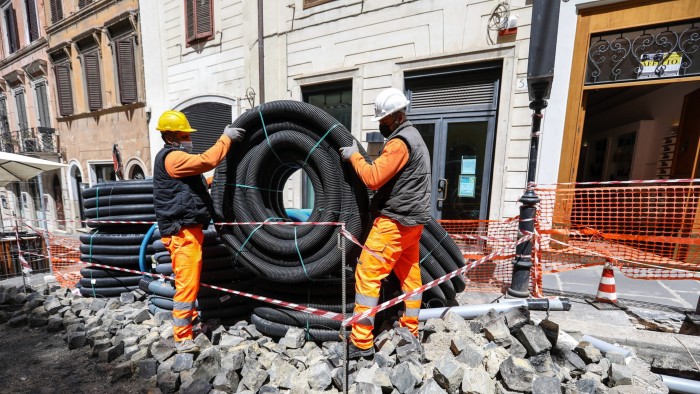Unlock the Editor’s Digest for free
Roula Khalaf, Editor of the FT, selects her favourite stories in this weekly newsletter.
KKR has chosen to forgo dividends from its Italian telecoms business FiberCop after an acceleration in the rate of customer losses, suggesting that one of Europe’s largest ever private equity deals is in danger of turning sour.
Customer losses at FiberCop, which houses the fixed-line network business carved out of Telecom Italia in a €22bn deal last year, totalled 364,000 in the first half of 2025, putting the business on course to fall short of KKR’s initial projections.
The performance has resulted in FiberCop opting against paying dividends to KKR and other investors, including the Italian ministry of finance and Abu Dhabi’s sovereign wealth fund Adia.
KKR initially envisaged that FiberCop would begin paying out dividends from December last year, according to internal documents seen by the Financial Times, which detail how KKR’s projected five-year returns would be several percentage points lower without the payouts.
A person close to KKR said that the board had never signed off on this timing of dividend payments and that it was choosing to reinvest into FiberCop. The company’s scope to return money to investors would be greater once FiberCop’s network rollout completes in 2027, the person added.
FiberCop’s customer losses are hurting revenues and weakening KKR’s hand as it tries to resist pressure from the Italian government to merge the company with its smaller, state-controlled rival Open Fiber.
KKR fears the terms of any deal — which would allow the government to maintain oversight of strategic national infrastructure — would be unfavourable given FiberCop’s customer losses and the subsidies that Rome is giving to Open Fiber, according to three people close to the discussions. The tensions were first reported by Reuters this week.

When the carve out deal was sealed in July 2024 it provided a lifeline to heavily indebted Telecom Italia, while appearing a win for KKR, handing it ownership of strategic communications infrastructure in one of Europe’s largest economies.
But the deal got off to a rocky start. In a draft business plan shared with investors in January, FiberCop’s management forecast a €2bn shortfall in earnings before interest, tax, depreciation and amortisation over five years relative to KKR’s forecasts.
This led to a clash between KKR and FiberCop’s management, which resulted in the departure of then chief executive Luigi Ferraris.
In the spring the KKR partner who oversaw the deal, Alberto Signori, was replaced on FiberCop’s board of directors by Tara Davies, a more senior figure at the firm who co-heads KKR’s business in the region.
Documents drafted by KKR at the time of the buyout show it expected FiberCop to have 15mn active connections by the end of 2025. Line losses so far this year have instead reduced FiberCop’s total connections to 14.1mn as of June.
FiberCop said a reduction in lines was expected this year as it replaces its legacy copper network with fibre. Customers are not automatically switched over during this process and are free to leave for a rival. A person familiar with KKR’s thinking added that the impact was being offset by higher revenues from business accounts and cost savings.

James Ratzer, an analyst at New Street Research, said FiberCop was expected to be “a steady cash generator” but added that tough competition means the cash flow outlook is now “far worse than the initial business plan”.
Rating agency Moody’s has placed the company on negative outlook, reflecting expectations that its credit metrics will be hurt by substantial investment over the next two years.
“Additional pressure could emerge from . . . the implementation of a financial policy that prioritises shareholder returns over creditor interests, including debt-funded acquisitions or dividend distributions, during [fibre] rollout phase,” Moody’s said.
KKR said FiberCop has “performed strongly” since the buyout and it has over €5bn of liquidity.
“Claims of underperformance or financial strain are inaccurate and contradicted by audited results, a successful bond issuance, and positive ratings coverage from all three major agencies,” KKR said.

FiberCop said in a statement last month that dividends would be “prudently” decided on a yearly basis and that “the half-year results are in line with the expectations of our shareholders”.
In 2024, FiberCop’s earnings totalled €1.9bn. In the first six months of this year, the company reported €824mn in earnings. A person close to KKR said FiberCop’s earnings and free cash flow were tracking in line with its expectations.
Additional reporting by Kieran Smith in London












